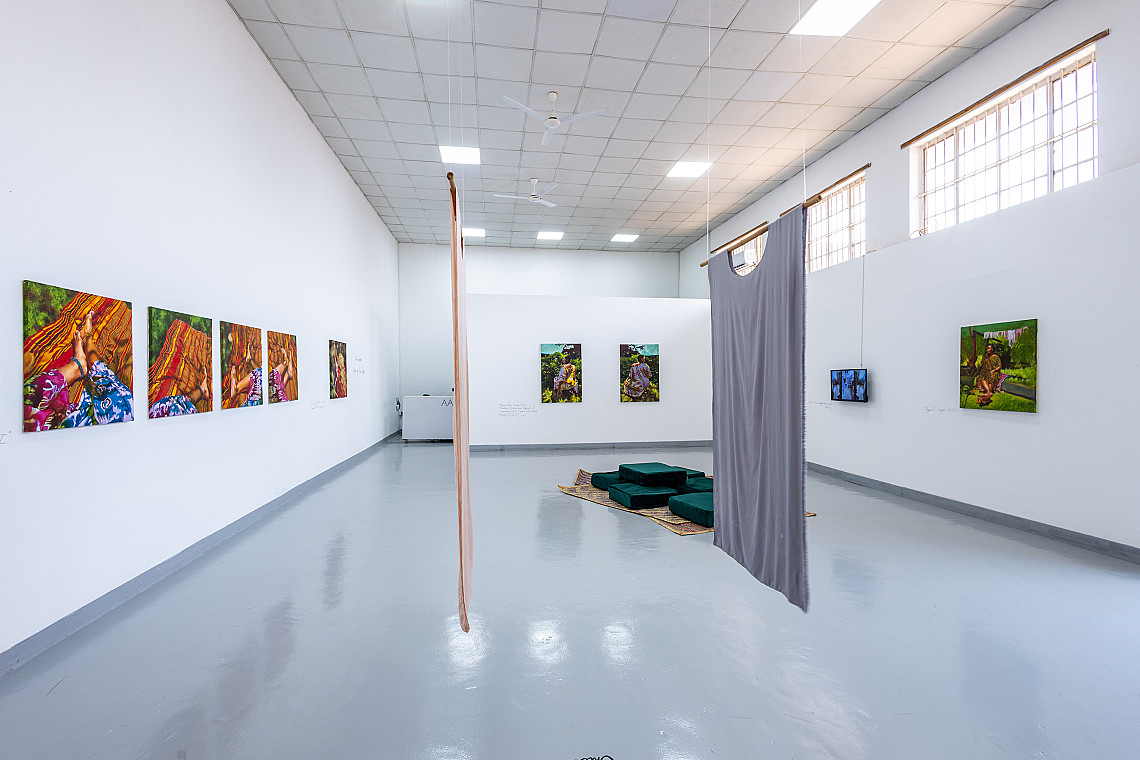
September 20, 2025 - November 08, 2025
Afriart Gallery Kampala
From June to August 2025, The African Arts Trust (TAAT) in Nairobi presented the inaugural solo exhibition of Kenyan artist April Kamunde (b. 1988, Nairobi). From September to November 2025 the exhibition now travels to Uganda — an artistic “homecoming” of sorts, as Kamunde began her full-time practice through a residency at Afriart Gallery’s Silhouette Projects.
So I lie here. . .
sleeping the fatigue of questionable
upping and downing
to-ing and fro-ing. . .
Thank you for the space,
and so much else.
- Ama Ata Aidoo, A Postcard from My Vacation - for Micere Mugo (II) -
April Kamunde’s painting practice renders light in remarkable ways; with clarity, intention and reverence. Working primarily in figuration, Kamunde foregrounds moments in which African women are at rest, painting her sitters in vivid detail and rich colour highlighting relatively unspectacular moments — sitting cross-legged on a leso; basking, face lifted to the sun; napping under a tree; strolling; pausing with hands akimbo. Each scene occurs outdoors, surrounded in the green of nature.
Initially responding to the state of deep fatigue within herself and many of the women in her life, Kamunde’s compositions magnify worlds in which black women are the protagonists, reclaiming connection to themselves, their time and their pleasure. Writer and activist Jessica Horn, in the essay Capitalism’s Crisis of Care, posits that “The assertion of the right not to labour is an important one given that African women are expected to perpetually labour with little consideration for the right to rest.” Consequently, to witness Kamunde’s meticulous paintings attending to unburdened time invokes re-enchantment, where viewers are invited to slow down, linger, soften, and possibly peel back the numbness inscribed by grind culture. The poetic and sometimes humorous titles of the work further signal the narrative intentions of the paintings, as evident in titles of previous work such as Sometimes Wellness Looks Like Stocking Up On Vitamin D And C (2024), Afueni Mdogo Mdogo I, Small Small Relief (2024) and Sijiskii (2023).
In her latest body of work, Fabric of our Being, an extension of the ongoing series Rest: The Pursuit of Peace, Kamunde further examines the dera. This dress features in her work as a motif for rest, and now, in this suite of paintings, Kamunde teases out the more nuanced and sometimes contradictory perceptions and projections associated with this garment. In speaking to friends, family and colleagues, as well as referencing newpaper articles as a point of departure, Kamunde found new ways to consider the dress through painting, sound, video and installation. For example, the dera is a dress that often signals rest in its looseness and comfort, but for the artist and other women in her life, it also serves as a ‘uniform’ of sorts, suitable for chores around the house, for working from home and on and on. Additionally, a it originated in Yemen, and then through trade routes arrived in Somalia and later the Kenyan coast and further inland, the dera was designed for warm weather climates as characterised by its loose fitting and light nature. With no zips or buttons, it also straddles the line between modesty and sensuality in how it falls on the body, suggesting a push and pull between respectability and presentability.
Fabric of Our Being holds a dual invitation, for audiences to think materially with the dera and our societal readings of this garment as pertains to gender, work, and respectability politics, and further to look inward to what it is that makes us human; our essence, our consciousness. The latter is a question for which have a lifetime to parse - what in fact is the fabric of our being?
Your body is a site of liberation. It doesn’t belong to capitalism. Love your body. Rest your body. Move your body. Hold your body... Rest makes us more human, it brings us back to our humanness.
- Tricia Hersey, Founder, The Nap Ministry, author of Rest is Resistance
The exhibition is curated by Rosie Olang’ Odhiambo and Sharon Neema.